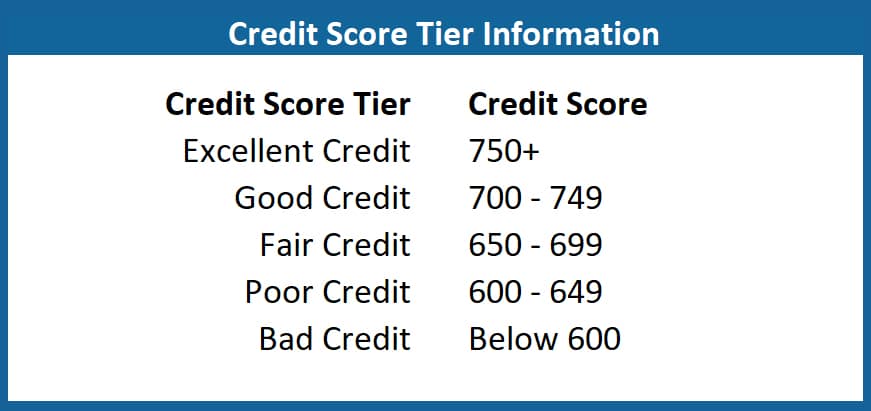You may be a successful, profitable business owner. Your organization may have an excellent business credit score, pay your creditors on time, and have never had a financial issue with your company.
Yet go for a business loan at a traditional bank and they factor in your personal FICO score when determining whether to give your company working capital. If you do not have a good or excellent credit score you will most likely get turned down by a bank.

It’s not fair but it’s the reality.
We help several businesses looking for funding that have been rejected by a bank due to low personal FICO (a type of credit score). They often state they run a successful business but their personal FICO is low due to a divorce, using personal credit to start a business, or even purchasing a home.
Alternative Lenders, such as Small Business Funding, will fund you with a bad credit score if you have a healthy business. But your terms will be higher given the level of risk.
Improving your credit score will give you more funding options with better terms.
But how do you go about improving your score?
Here are 9 ways to improve your credit score – fast:
1 – Make Sure Credit Reports Are Accurate
By law, you are eligible to receive a free credit report once a year from the 3 main credit reporting companies:
Equifax
Experian
TransUnion
You can request your free reports from annualcreditreport.com.
Once you receive your reports, look at each one very carefully to ensure their accuracy. If you see any errors or something that shouldn’t be there, contact the credit reporting company regarding your dispute. Here are the links to dispute something on your credit report you think is wrong: TransUnion, Equifax, Experian.
You don’t want something you were not responsible for to negatively affect your credit score.
2 – Reduce Your Debt Ratio (Credit Utilization Score)
Your credit-to-debt ratio, also known as your credit utilization score, impacts your FICO by 30%.

Exceeding a 30% credit utilization score at the time of a credit pull will negatively impact your FICO score.
So what does this mean?
Your available credit should not exceed your debt by 30%. So, for example, if you have two credit cards that each have a $5,000 credit limit, you have a total of $10,000 in available credit. Let’s say you put $6,000 of purchases on these 2 credit cards, your credit utilization score is 60%.

At 60%, this will negatively impact your credit score, even if you pay your bill on time and in full each month. A lot will depend on when your credit report is run – if it’s right after you make a payment and your rate is 0%, you will be fine. But if it’s run when you have over $3,000 in debt, it will negatively impact you.
To improve your credit utilization score, you have a couple of options:
1- Manage your financing to ensure you never exceed the 30% credit-to-debt ration
2 – Pay your bills twice a month instead of once
If these options don’t work for you, try:
1 – Ask for a credit limit, but don’t spend more with the increase. The credit increase will help you stay below the 30%.
2 – Open a new credit card account with a different card provider. The credit utilization score is based on your total open lines of credit and balances.
3 – Score Boosting Programs
Reach out to the main credit reporting agencies regarding a Score Boosting Program. This program allows you to add your other bills such as utility, phone, cable, etc to your credit score in order to show you have a positive payment history.
The two score boosting programs are:
4 – Get Added As An Authorized User
Get added as an authorized user on a friend/family members credit card if they make and will continue to make their payments on time each month. And their credit utilization score will be below 30%. As an authorized user, this account will appear on your credit report.
Before being added as an authorized user, have the primary account holder ask their credit card company if authorized users are reported to the three major credit reporting companies.
5 – Pay Your Bills On Time
Paying your bills on time is obvious but it’s worth reinforcing because your payment history is the top factor in determining your credit score.
If you have a history of making late payments, now is the time to making those payments on time.
It’s hard to say when your credit score will start improving after months of on-time payments but eventually it will start improving.

6 – Pay Off Collection Accounts
Do you have an account that’s been sent to a collection agency?
If this account hasn’t been sent to the credit reporting companies, pay it off in full. It will be harder to remove from your FICO once it’s been reported.
If the collection account is on your credit report, contact the collection agency and agree to a “pay for delete”. This is when you agree to pay your debt in full as long as the agency agrees to remove the collection account from your credit report. Make sure you get this in writing with a “pay for delete letter.”
7 – Delete Late Item With Credit Bureau
If you have any late items on your report, you can ask the creditor to delete those late items with credit bureau. However you should only do this if you have a recent history of making on-time payments. The creditor won’t work with you if you have recent late payments.
Not every creditor will adhere to your request but it’s worth the phone call.
8 – Make BI-Monthly Payments
Making bi-monthly payments won’t directly improve your credit score but the results of that action will.
By paying your credit card twice a monthly you are helping to improve your chances that your credit utilization score remains under that 30% threshold discussed earlier.
Also, by getting on a schedule where you pay every 2 weeks or so, you are ensuring that you will not be making a late payment.
Those 2 factors will improve your overall FICO.
9 – Limit and Space The Number of Hard Inquiries
If you are looking for a personal loan or business loan, limit the number of hard inquiries (or pulls) that creditors checks your credit score. Each time a hard inquiry is made, it will reduce your score.
Too many hard inquiries in a short amount of time make it look to creditors that you are having a difficult time getting a loan. Also, for every hard inquiry it will drop your score by 5 – 10 points each time.
Some companies, such as Small Business Funding and our network of lenders, will not run a hard inquiry. We will receive multiple business lending offers on your behalf by looking at the health of your business. This type of credit check may be necessary with some funding options but that will be after we have an initial quote for you.
Benefits
Improving your credit score is a challenge that will take a lot of effort on your part. But the benefits are more flexibility. It will open you up to multiple funding options and better terms for your business.
Depending on the damage done to your credit, it could take up to 10 years to clear those negative items from your credit report (see below).

Truth is, based on how low your credit score is, it will take time to improve. There is no overnight fix but as we highlighted above, you can take some quick actions to start improving your credit score today.

